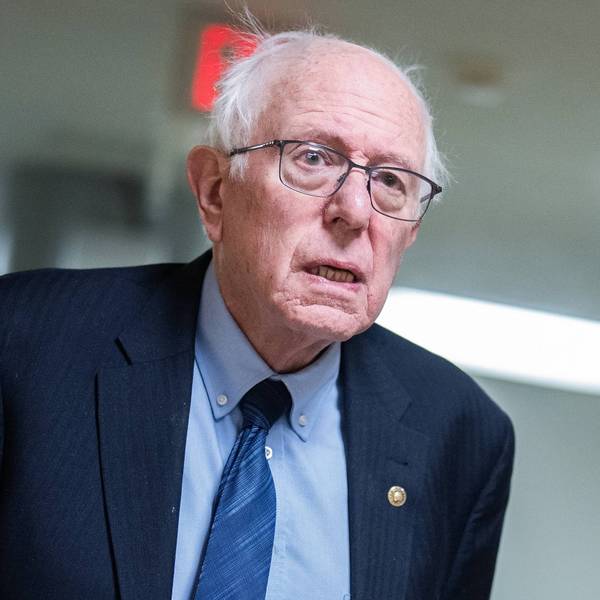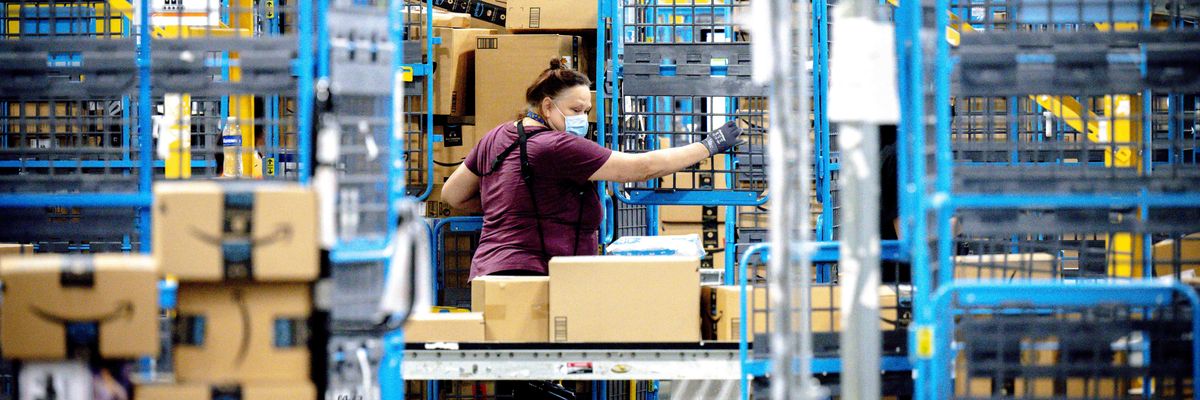Sen. Bernie Sanders on Tuesday launched an investigation into the notoriously dangerous working conditions at Amazon's U.S. warehouses, writing in a letter to CEO Andy Jassy that the company's "quest for profits at all costs" has put the health and safety of tens of thousands of workers at risk.
"Amazon is well aware of these dangerous conditions, the life-altering consequences for workers injured on the job, and the steps the company could take to reduce the significant risks of injury," wrote Sanders (I-Vt.), the chair of the Senate Health, Education, Labor, and Pensions Committee. "Yet the company has made a calculated decision not to implement adequate worker protections because Jeff Bezos, Amazon’s founder, and you, his successor as Chief Executive Officer, have created a corporate culture that treats workers as disposable."
"At every turn—from warehouse design and workstation setup, to pace of work requirements, to medical care for injuries and subsequent pressure to return to work—Amazon makes decisions that actively harm workers in the name of its bottom line," the senator continued, taking the company to task for "pushing workers past their limits" and refusing to provide adequate medical care when they are injured.
Sanders' probe comes weeks after a report by the Strategic Organizing Center found that Amazon warehouse workers—who are closely surveilled and held to grueling performance targets—suffered serious injuries on the job at more than twice the rate as employees at non-Amazon facilities last year, a safety risk that has helped fuel unionization efforts at the company.
The e-commerce giant has also faced growing scrutiny from federal regulators. Earlier this year, the Occupational Safety and Health Administration (OSHA) cited several Amazon warehouses for "failing to keep workers safe" and "exposing workers to ergonomic hazards."
In his Tuesday letter, Sanders called Amazon's warehouse conditions "dangerous and illegal" and demanded that Jassy "explain why Amazon's injury rates continue to be significantly higher than the warehouse industry average despite identification of those measures."
The senator also requested that Jassy disclose whether the company has "ever examined, internally or through a third party, the connection between the pace of work of its warehouse workers and the prevalence or cost of injuries at its warehouses."
"If Amazon can afford to spend $6 billion on stock buybacks last year, it can afford to make sure that its warehouses are safe places to work," the senator wrote. "If Amazon can afford to pay you $289 million in total compensation over the past two years, it can afford to treat all of its workers with dignity and respect, not contempt. The time has come for Amazon to stop willfully violating workplace safety laws with impunity and commit to changing its operations to protect the health and safety of its workers."
On Twitter, Sanders called on any current or former Amazon workers with experience in the company's warehouses to share their stories and "help inform the investigation."
"For tens of thousands of workers, the cost of just a few years at an Amazon warehouse is a lifetime of pain," Sanders wrote in his letter to Jassy. "My staff and I have heard concerning stories from workers around the country about the toll that working at Amazon warehouses takes on their bodies."
"Mr. Jassy," Sanders added, "there is only one explanation for Amazon's repeated failure to protect its warehouse workers: unacceptable corporate greed."




